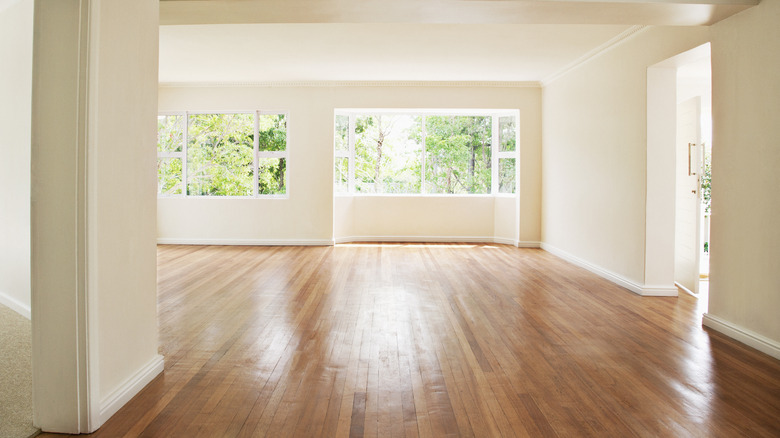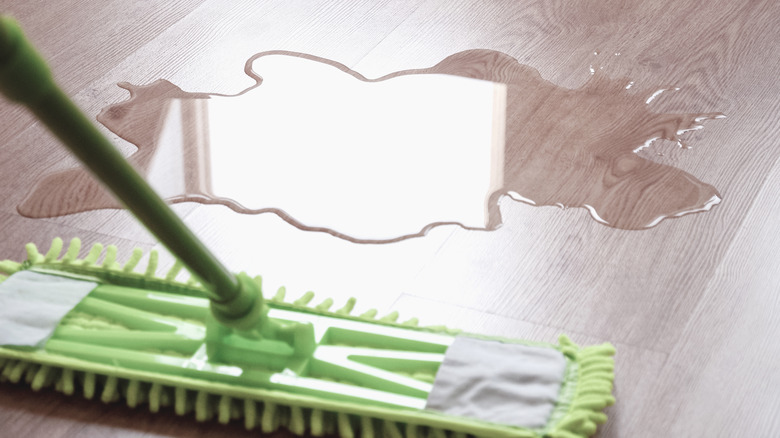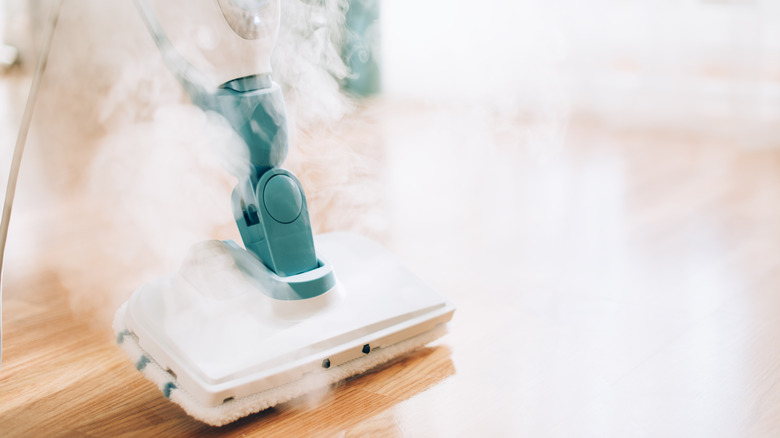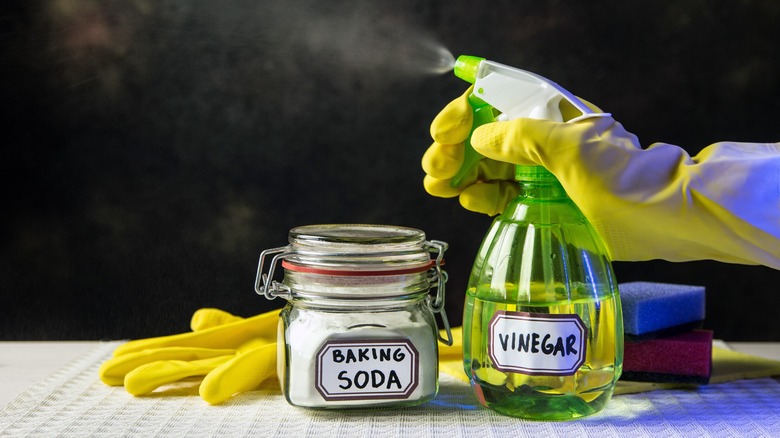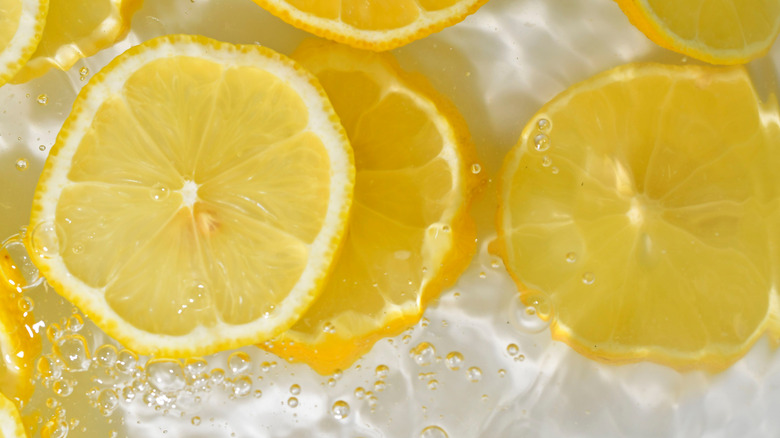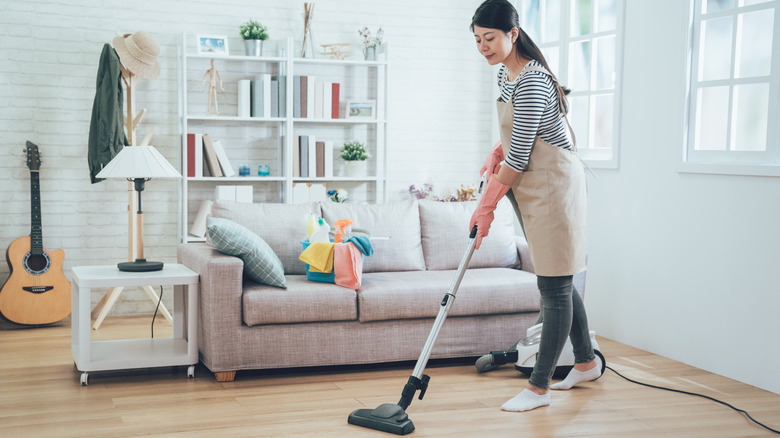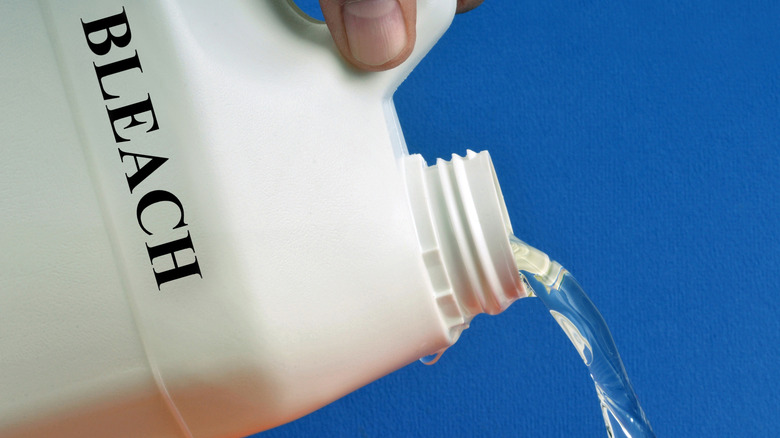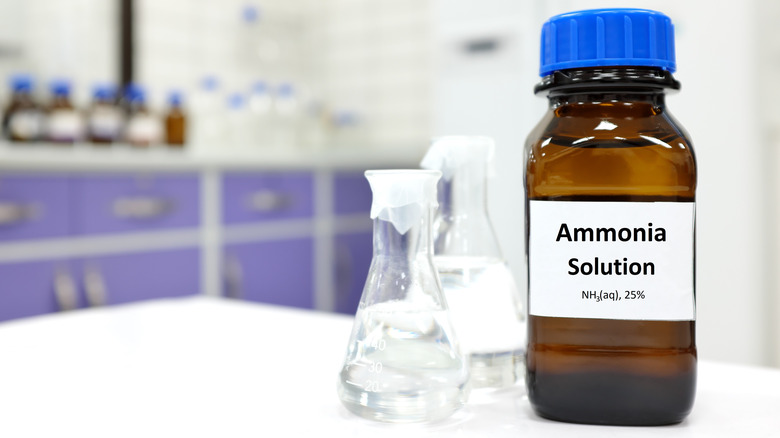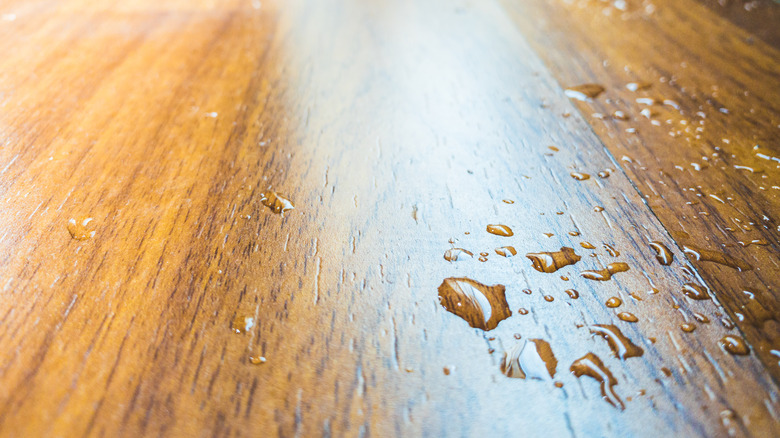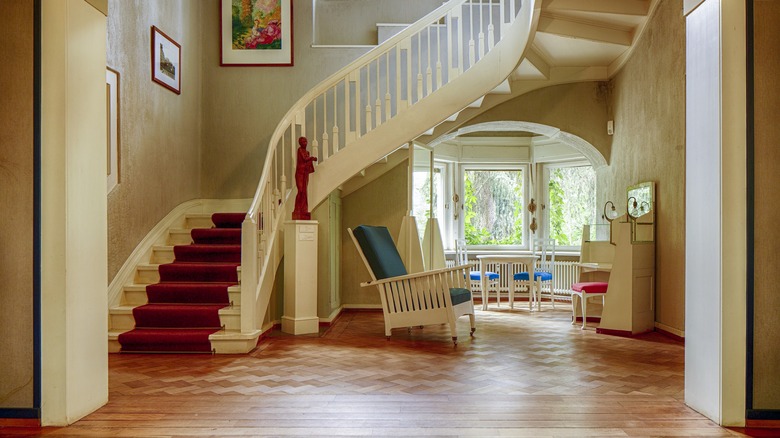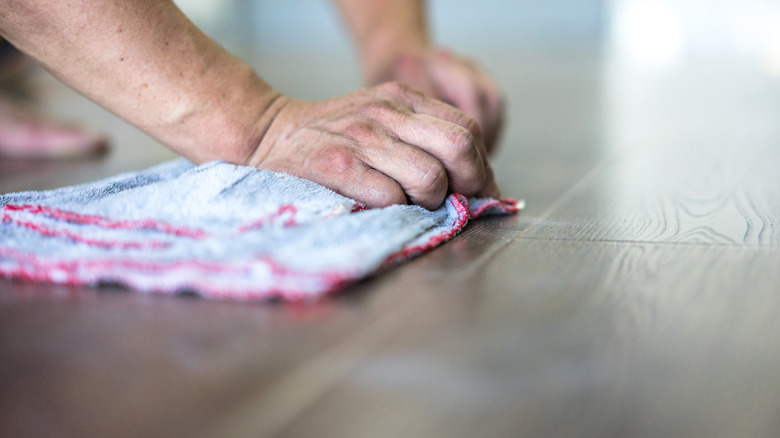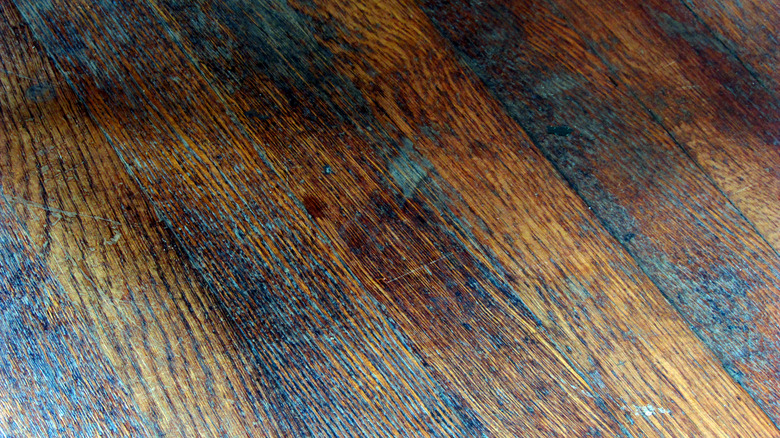Never Use These Items On Your Hardwood Floors To Give Them A Longer Life
Although a luxurious white shag carpet may have a glamorous charm, it is impractical, and if you're not diligent with its care and upkeep, unhygienic! Laminate flooring and tiles have their place, but they're made for universal utility rather than aesthetic reasons. Hardwood floors, on the other hand, have a natural and almost otherworldly appeal that makes them a pleasure to the eye, foot, and soul. But they won't stay beautiful for long if you use the wrong cleaning products.
There's nothing that mixes function with a subtle sense of high style than a well-laid hardwood floor. It is stark in its simplicity, stately in its sophistication, and princely in its practicality. Yet like all good things in life, hardwood floors need to be looked after and nurtured. But be warned; a poorly thought-out cleaning strategy can destroy the floor of your dreams. Here's a handy list of items you should never use on your hardwood floors if you want them to stand the test of time.
Never soak them with a mop
Taken at face value, it would appear that wood and water go together like sugar and spice. Trees need water to grow, and ships made of wood once sailed the seven seas. However, the hull of these ships was heavily coated with thick tar to stop the saltwater from seeping in and rotting the wood. Tapwater hasn't got any salt in it, but put it in a bucket and soak your hardwood floors with it, and you'll pay a heavy price. Experts and manufacturers strongly recommend against using water on hardwood floors because no hardwood floor, even if treated with layers of a protective finish, is entirely waterproof.
A little moisture in the air can cause hardwood floors to shrink or expand, so just imagine what a regular scrubbing with a soaking-wet mop will do. It's not pretty! Treatments such as polyurethane act as a barrier on the surface of the wood, but when water seeps through the cracks that may not even be visible to the naked eye, the fibers of the floor are exposed. Water can cause the wood to not only permanently warp but also discolor and dull the floor's finish. Regularly soaking your hardwood floor with a mop can lead to blackened, stained, and moldy flooring. In the worst-case scenario, it will ruin them completely.
Steam mops are also a no-go!
It's often a rookie mistake to think that if you can't use a water mop on your hardwood floor, then a steam mop is the perfect alternative. Wrong! Steam is just boiled water, and those tiny droplets that hang about in the air after the water has been evaporated are no friend to your hardwood floors. Marketing and merchandising manager at Lumber Liquidators, Steve Stocki, told Consumer Reports that even moisture triggered by a steam mop could work its way between the joints and warp the wood. His advice is to avoid the temptation of thinking a steam mop is a quick-fix solution.
Stocki explained, "Drastic temperature changes and moisture may warp the wood." He added that this also applies to solid and engineered wood floors and bamboo. Consumer Reports test engineer Larry Ciufo warned, "You might think you can use a steam mop on many surfaces because it's just hot water. But the reality is, if you're not careful, they can do some damage." Instead of using a wet or steam mop, it's always preferable to use a broom or vacuum cleaner to care for your hardwood floors, and if necessary, only use a damp cloth, but never a soaking or steam mop.
Treat vinegar as the enemy
Vinegar has numerous properties that are beneficial to our health, and it has also been used as a chemical-free cleaner for centuries. Yet although it might work wonders on your windows, stove, kitchen sink, and tile and stone floors, treat it as a mortal enemy when it comes to hardwood floors. When you clean your hardwood floors, it's crucial to understand that you're actually cleaning the protective finish. And as anyone with a passing acquaintance with elementary science knows, vinegar's acidic content, even when diluted with a bit of water, has a terrible habit of breaking down any protective barrier of chemicals, leaving your lovely hardwood floor defenseless and looking as dull as dishwater.
The process won't happen overnight, but after one to two years of soaking your floors with a little vinegar, its protective coating will have been ground down to zero. More importantly, your wood, which once sparkled with a vibrancy and a vigor, will need to be resanded and resealed.
Go easy on the lemons
Much like vinegar, lemons have proven invaluable for those who want to clean their house in a natural, chemical-free, and relatively inexpensive way. Deodorizing your drain, polishing furniture, cleaning a cheese grater, freshening up your fridge, cleaning grill grates, and using it as an air freshener are just some things, apart from making lemonade, you can use lemons for. A little lemon juice can also be used for cleaning floors, but for the sake of your wood's welfare, make sure it is diluted.
Natalie Wise, who wrote "The Natural Home: Tips for Cleaning with Natural Ingredients," told Today, "I don't recommend using vinegar or lemon juice, at least not in large quantities, as these can damage the floor's seal." If you choose to use lemon juice on your hardwood floors, use an extremely diluted concentration and ensure you rinse and dry the wood once finished.
The wrong sort of vacuum cleaner can suck the life right out of your wooden floor
Although vacuum cleaners are an absolute godsend when tackling the dust, debris, and other assorted flotsam and jetsam that carpets attract and generate, the wrong sort of vacuum cleaner can suck the life clean out of your hardwood floors. Compared with sweeping, which is often just an exercise in shuffling the dust and dirt around, vacuums actually suck up life's little leftovers from your hardwood floor, and so it's essential to pick the right tool for the job.
Although they might boast impressive suction, upright vacuum cleaners are a definite no-go because most come fully equipped with a beater brush covered in coarse bristles. These brushes are specifically tailored to beat up your carpet and get it to shake loose all the unwanted stuff that has set up camp. Such vacuum action might work well on fibers, but over time it will scuff and scrape your hardwood floor and leave it in a sorry shape. Even the wheels of an upright vacuum can cause considerable damage to your hardwood floor. A safer option is a canister vacuum. They are lighter and smaller, and the lack of a beater bar makes them far more forgiving. To keep things simple, why not opt for a light stick vacuum specifically tailored for hardwood floors?
Bleach is no friend of hardwood floors
Bleach is the heavy-duty cleaner everyone turns to when they feel the need to get a little apocalyptic on any tough stains, dirt, and germs that dare violate the sanctity of our homes. It's tough, uncompromising, and always gets the job done with minimal fuss. However, hardwood floors call for a lightness of touch that is not exactly bleach's calling card. Bleach contains a powerful active chemical called sodium hypochlorite that is wonderful for stain removal, but what works well on kitchen surfaces, toilets, and laundry, isn't so hot on hardwood floors.
The sodium hypochlorite in bleach is a caustic agent that will infiltrate your hardwood floor's finish or treatment like a toxic double agent and harm its integrity and fundamental structure. Bleach will lighten the wood over time and cause an overall effect that is miscolored and mismatched. Bleach-damaged floors can be remedied by restoration, but do yourself a favor and avoid this nightmarish situation by keeping your bleach and hardwood floors separated.
Ammonia-based cleaners will greatly shorten your hardwood floor's lifespan
There are a number of multi-surface cleaners and floor-polishing waxes that contain ammonia. The common chemical is found in many household cleaning products because it has a hell of a punch when busting up grime and stains of all types and persuasions. Yet if there's something sticky and unidentifiable on your hardwood floor, don't call in the A-team because ammonia has a habit of making things worse. Many proud hardwood floor owners have learned the hard way that ammonia-based cleaners leave behind a dull, discolored, and deteriorating mess.
This is somewhat ironic because, for centuries, woodworkers have been using ammonia fumes to deepen and enhance the natural color of wood. Compared to stained or dyed wood, fumed wood has a natural and woody appearance. The natural tannins in many species of wood respond to ammonia fumes and cause a process of coloring and darkening that enriches it. However, woodworkers fumigate, not soak the wood in specially designed environments, and know exactly what they are doing. When most of us approach a wooden surface with a product containing ammonia, it nearly always ends badly, so steer well clear.
Hydrogen peroxide must be used sparingly
Traditionally known as an antiseptic and used to kill germs and treat wounds, hydrogen peroxide is no longer advised by doctors for use on the skin because of various complications and the delays it can cause to natural healing. Yet the solution renowned as Mother's Nature cleaner remains hugely popular with house advocates everywhere who swear by its power for cleaning sinks, disinfecting surfaces, shining mirrors, getting rid of mold and mildew, and removing laundry stains. It is also an effective cleaner for your hardwood floors but must be used sparingly.
When using hydrogen peroxide on your hardwood floors, it is advisable not to go over a concentration of 3% unless you risk discoloring the wood. As well as being non-toxic and friendly towards the environment, hydrogen peroxide is great for your hardwood floors because it both disinfects them from germs and removes all sticky stains and dastardly dirt. It also dries wood as it cleans, preventing the damage and warp that often follows in moisture's trail.
Don't use Murphy's Oil soap
Although Murphy's Oil soap might have a reputation as a wood floor cleaner that can shine your floors while cleaning them, it's important to do your research in this case. Artistic Floors by Design's Joni Rocco told Clean ReCoat, "Polish. It is one of my least favorite words in our industry! I am specifically talking about the floor-cleaning chemical solutions that most unassuming homeowners or housecleaning companies apply to hardwood floors to 'shine them up.'" Because Murphy's Oil soap is not sufficiently diluted and is an oil-based polish, it is often responsible for leaving a permanent and greasy oily residue on your hardwood floors. In essence, it leaves them looking dirtier and shabbier than ever.
Over time, every layer of Murphy's Oil soap you apply will trap any dirt or grime already there, leading to their gradual disintegration. A wood specialist explained that Murphy's Oil soap should never be permitted anywhere near finished hardwood floors. They explained, "Murphy's Oil soap has ruined millions of square feet of wood flooring. And I mean millions and millions of square feet." Houzz Professional S.J. McCarthy added that if you have used Murphy's Oil soap on your floor, to get in touch with a flooring professional and "Pay them to remove whatever is on there."
How to clean hardwood floors without damaging them
So we've been through exactly what not to put on your hardwood floors if you want them to have a long life. Admittedly, all the don'ts can get a little exhausting, so let's introduce some positivity into the mix and find out exactly what you can use to clean your hardwood floors without damaging them. As in most things, simplicity is the solution. As we've mentioned earlier, hydrogen peroxide in minuscule amounts is a safe bet. Sweeping your floors daily is a good idea to keep them free of dust and debris without damaging them, but too much water will not do your hardwood floors any favors. However, sometimes a little cleaning with a damp cloth or mop is unavoidable.
Natalie Wise, author of "The Natural Home," told Today, "You don't want to let any water sit as you're cleaning your hardwood floors, so be sure to work in one small area at a time." Wise adds, "Make a cleaning mixture using 4 cups warm water and a few drops of castile soap or dish soap. Do not shake, but gently mix this, then mop or scrub small sections at a time, drying them with a clean cloth or dry mop after." Author of "Cleaning Plain & Simple," Donna Samllin Kuper warns, "Some hardwood floor manufacturers recommend using a mop dampened with water only, and may even void a warranty on new floors that have been cleaned with any other cleaning solution."
Signs that your hardwood floor is in distress
If you want to keep on impressing visitors to your humble abode with your impeccable taste and immaculate style, then it's important to know what signs to look for when your hardwood floor is in distress. Moisture is usually the main culprit when things go awry. When your floors begin to expand and contract, and cracks and separations start to appear between the boards, it can be due to seasonal changes and the fluctuating humidity levels in your room due to central heating.
Such issues usually resolve themselves, but you can help remedy the situation by installing a humidifier during the winter months. However, those unsettling cracks and separations can also be a tell-tale sign of water damage. Other signs to look out for are when the wood lifts noticeably from the subfloor (aka buckling), when the center of a floorboard is raised when compared with the edges (crowning), and when the edges are more raised than the center (cupping). All three conditions are caused by the absorption of too much moisture in your hardwood floors. To avoid these dire situations, remove any spills with haste and treat your hardwood floors with the kindness and respect they deserve.
